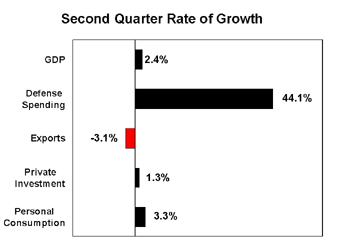July 31, 2003
Smoke, Mirrors, War, Economy
So I read the headlines today, GDP grows 2.4%, finally some good news on the economic front. And unlike some I don't hate Bush so much that I don't want the economy to recover. We can get rid of him anyway. Anyway the good news last a whole couple of hours before the good Billmon set it strait:
Whiskey Bar: War, What is it Good For?
Shit, damn, motherfscker... At least the economy grew 0.7% that's better then nothing. But damn can Bush get anything right besides putting money in his friends pockets?
addendum: if that wasn't bad enough, Calpundit points out that the 2.4% number is projection for the whole year! It takes about 3.5% a year in growth just to the country from losing jobs. So were looking at something more like 1% growth this year, in other words a hair better then a full on recession. Like father, like son, only bolder and dumber, great.
plateau # finishing thoughts
A Thousand Plateaus is "finished". As in I read every page. Some more then once or twice. As for the actual words, I'm notoriously poor at actually reading all of them, always looking for the larger patterns, not the precise sequences. Anyways I'm assuming I'll need to return... Some random thoughts
Couldn't abstract machines more accurately be called algorithms?
While the authors seem to tie "the State" directly to striated space, its seems that many states are actually using striation in 3D space in order to move in the smooth space of time. To reach a plateau where the state always has existed and always will exist.
Continuing on one could say that striated and smooth space don't just interweave, but sometimes exist at exactly the same point. From angle a striation may actually be a path through smooth space.
Is Google "the State" of the web. Its constantly spidering, or deterritorializing, web sites, then indexing and reterritorializing them as search results and cached pages. However Google generally in not fully blocking the line of flight, its just pausing it, indexing it and presenting the user options back to the original territories.
music.weblog
music.journalism.blogsphere - -- - -- . .- - . .- - -- tobias c. van Veen - -- - -
good piece covering the quite small (as far as I can tell) music journalism blogsphere. I would really like the see this realm grow, but I have to say I'm really frustrated with the lack of RSS feeds in this world. Makes it damn hard to keep up with a weblog if they don't have a feed. Perhaps if the pioneers had feeds things might grow a bit faster?
So I'm making an offer to anyone currently music weblogging without an RSS feed or who would like to start one, I'll set you up with a free moveable type site on my server. Ad free and what not. Only caveat (for tech reasons) is that it needs to be on one of my current domains, preferably stateofemergence.com. Oh and of course you'll need to convince me that you have reasonably good taste in music. But I'm open. Just shoot an email to me if you are interested. Feel free to spread the word. Over is open ended until I decide to stop it.
July 30, 2003
July 29, 2003
21C
Issue to of the revived21C Magazine is now out. It used to be an Australian mag, but now Paul Miller is running it. Its online only at the moment, but he's been promising a print version for a while now...
Anyway loads of good stuff, including an article by my partner in 47, [sic] on Propagate, his collaboration with Shepard Fairey. The video clip doesn't seem to be working, but keep on the look out cause its impressive. And yeah, he's looking for funding to take through round through, so if you got the cash, get in touch...
[via Quadrant Crossing]
July 28, 2003
Fsck Friendster: Tribe Dot Net
Yeah friendster barely works anymore, and I still can't get a cup of coffee without overhearing someone talking about it. Enter Tribe.net as a potential alternative. I actually participated in a focus group with them a while back and am pretty impressed with their commitment to making a really useful social networking application. If they can get members of course. So far so good though.
The look and feel however is just plane awful. Well mostly just plane corporate looking. Friendster manages to feel pretty intimate and personal. So far Tribe feels more like the lobby to a suburban corporation. Not to mention the logo looks like a bad attempt at rave graphics from dot com era. Which if you might recall is over... Still this a beta. These people seem way more open then the Friendster heads, potential is high.
Barnstormers Bass Storm







So I was lucky enough to be at the Barnstormers warehouse as they fired up their latest piece(s). A massive sound system of hand built and hand painted speakers. A calm barbeque transformed into a just won the world series style celebration as the hundreds of speakers all pumped noise together for the first time. A premium moment for sure.
The piece itself is fucking out of control. The post graffiti art world seems to be overrun with gimmick group shows lately, paint a gas tank, paint an Eames chair, paint some adidas. This is not a gimmick. The sound system is real, the speakers work and its seriously impressive visually. 20 artists I think. Don't want to show too much, you need to see this for yourself. The show opens in North Carolina the end of this week. NY in the fall, and hopefully the Punch Gallery in SF in the spring.
And yeah, some Barnstormers history can be found here.




July 27, 2003
Markets and Antimarkets
The best part about Manuel DeLanda Annotated Bibliography was discovering that DeLanda actually wrote a whole series of "markets and antimarkets" essays. I had read one of them, but was unaware that there were more. Spent some time reading them all. My favorite of the bunch is Markets and Antimarkets in the World Economy. It was written in 1996 but minus a few historical asides it could just as well have been written yesterday.
I'm going to pull some key quotes, but first let me make an important note that DeLanda has since stated that where he to do these essays again, we probably not rely on the simple "market" vs. "antimarket" dichotomy. There is a strong need for further nuance and articulation. But the core argument is still extremely pertinent.
These new ideas are all the more important when we move on to the social sciences, particularly economics. In this discipline, we tend to uncritically assume systematicity, as when one talks of the "capitalist system", instead of showing exactly how such systematic properties of the whole emerge from concrete historical processes. Worse yet, we then tend to reify such unaccounted-for systematicity, ascribing all kinds of causal powers to capitalism, to the extent that a clever writer can make it seem as if anything at all (from nonlinear dynamics itself to postmodernism or cyberculture) is the product of late capitalism. This basic mistake, which is, I believe, a major obstacle to a correct understanding of the nature of economic power, is partly the result of the purely top-down, analytical style that has dominated economic modeling from the eighteenth century. Both macroeconomics, which begins at the top with concepts like gross national product, as well as microeconomics, in which a system of preferences guides individual choice, are purely analytical in approach. Neither the properties of a national economy nor the ranked preferences of consumers are shown to emerge from historical dynamics. Marxism, is true, added to these models intermediate scale phenomena, like class struggle, and with it conflictive dynamics. But the specific way in which it introduced conflict, via the labor theory of value, has now been shown by Shraffa to be redundant, added from the top, so to speak, and not emerging from the bottom, from real struggles over wages, or the length of the working day, or for control over the production process.
...
Fernand Braudel has recently shown, with a wealth of historical data, that this picture is inherently wrong. Capitalism was, from its beginnings in the Italy of the thirteenth century, always monopolistic and oligopolistic. That is to say, the power of capitalism has always been associated with large enterprises, large that is, relative to the size of the markets where they operate.
...
First of all, if capitalism has always relied on non-competitive practices, if the prices for its commodities have never been objectively set by demand/supply dynamics, but imposed from above by powerful economic decision-makers, then capitalism and the market have always been different entities. To use a term introduced by Braudel, capitalism has always been an "antimarket". This, of course, would seem to go against the very meaning of the word "capitalism", regardless of whether the word is used by Karl Marx or Ronald Reagan. For both nineteenth century radicals and twentieth century conservatives, capitalism is identified with an economy driven by market forces, whether one finds this desirable or not. Today, for example, one speaks of the former Soviet Union's "transition to a market economy", even though what was really supposed to happen was a transition to an antimarket: to large scale enterprises, with several layers of managerial strata, in which prices are set not taken. This conceptual confusion is so entrenched that I believe the only solution is to abandon the term "capitalism" completely, and to begin speaking of markets and antimarkets and their dynamics.
Brightly Colored Food, Small Worlds and Social Clouds
Met up with Chad Thornton of brightly colored food yesterday. Chad emailed me a few days back noting that
1 - we went to the same school
2 - he read this site
3 - he once played in a band with a business partner of mine
4 - he knew two of my cousins.
and of course we shared a similar interest in interface design. and I quickly learned he used to be roommates with a good friend of mine.
But some how we'd never met.
These sorts of dense interconnections never seize to fascinate me. At the same time though, I come to expect them, they are so common. You can never predict the specifics, but they occur with regularity no matter where I am. Small world.
Except that its not, we live in a huge world. 6 billion people we are told. And as interesting as the interconnections are, I'm getting more and more interested in the lines of separation.
Things like friendster make it more and more clear that we exist in large scale social networks of hundreds of thousands of people. I call them social clouds at the moment. But beware I use the term cloud, not to represent what these networks resemble, but the emphasize the amorphousness of our knowledge of the dynamics of these networks. If they even exist, their existence is somewhat unproven, the evidence is anecdotal and peripheral at the moment.
Now some of these clouds and clusterings are pretty easy to guess at. Geography and religion are age old forces creating large scale social networks. Organizations like universities and governments generate their own large scale clusters. In the internet age, shared interests is a pretty efficient creator of such groupings as well.
I'd hypothesize that social networks also are divided by more arbitrary and random reasons. An exchange program between two schools creates a social flow. A chance meeting between two consummate networkers leads to a blending of their social clouds. A short love affair between a high school guidance counselor and college admissions officer leads to tight connection between the social networks of the two schools. The same admissions officer however hates the smell of another high school counselor's perfume, and rift grows between the two clouds.
Two people with similar backgrounds and education might live blocks apart, but drift through very different clouds. A meme might percolate through one cloud a year before the other, despite both clouds being in the same target market. Just as we find surprising connections between people I suspect we'll find the disconnects are just as surprising...
Armies of Money
As usual Billmon brings the sharpest political insights to the web. In the process he shows what's really going on with the Dean campaign and fundraising. Dean has empowered the managerial class. He's used the internet to bring campaign finance to the level where $200 matters. That's a half order of magnitude change from the previous level, where you really needed to give $1000 to make a difference. And for that he should be commended.
So its a change for the slightly better, but only slightly better. Instead of the top 2% running things its the top 10%. Its still an oligarchy. Power is still concentrated at the top. We can do better.
July 26, 2003
Plateau # breakdown of terms
A handy Glossary of some key concepts from A Thousand Plateaus. That's about as crisp and concise (oversimplified?) as it gets. Almost "finished' with the book btw. Finished as in read it all once (and parts many times), but not finished as in I'm likely to end up rereading major parts at some point.
Also I'll desperately need some "high quality" junk (read pulp) reading to cleanse the pallet and massage the brain. Freely send along any suggestions.
[via purse lip square jaw]
Growing Transit - The Bamboo Bicycle
Talk about rolling your own. I love shit like this. Stronger then steel and it grows like a weed. Looks like the bike might even be fixed gear. Hell yeah.
July 25, 2003
Just One
Apparently this photo has been circulating the web for a month now and just got mentioned in the NYTimes. Funny but sad. For those that don't get it the reference is to a long standing ad slogan of the Army Reserve, and perhaps the ROTC, and various National Guard units. They promise that you if join one of these programs you'll be obligated to be on duty for 'as little as one weekend a month'. Of course the 'as little as" gets very little emphasis. Bottom line though, is that US government seriously underestimated how much manpower they would need in Iraq. The blame falls almost entirely on Rumsfeld for this, he was well warned. A lot of the men in Iraq are reservists and National Guard units. The National Guard is actually just militia (as enunciated in the US constitution) from the 50 states! Pitiful.
Wonder what Bush, Cheney and co where thinking when they disrespected almost all our allies in the war build up? That they'd suddenly want to send their troops to Iraq to get killed off one by one a day after the "war" ended and occupation (aka war part 2) started?
[via the excellent Social Design Notes]
July 24, 2003
Simplify Your Life: Let Your Computer Vote For You
The noise in the system about problems with computer voting machines continues to rise. Nothing on the scandal level yet, but I'm listening. Anyway this looks like an excellent resource: Verified Voting - Campaign To Demand Verifiable Election Results
Street Car Desire
Electric Moyo .com will not get a proper link in this post. Still haven't seen the "street" component of this Nissan campaign, but street art central the Wooster Collective has photos and comments. And from a designers perspective What Do I Know has a good write up and discussion.
The jist, Nissan deliberately "vandalizes" its own ads in order to look "cool". The reality, if you get Ali G to write you copy you are going to look retarded. And more importantly if you want to make a car look "cool", make the actual car look good. Pretty simple. A cheap ad campaign is never going to make a shitty car hot.
The funniest shit is that they are the second car company this to try and borrow off graf culture. First attempt was so bad I can't remember what car they were trying to pimp, needless to say it was fucking ugly as sin. And had a "new" brand to hide its corporate roots. Don't think that campaign is going far. At least they had more subtlety, an art opening with free drinks and bad art from young artists. Good young artists too, there must have been something about the sell out that kept them from producing quality.
Truthfully I'd like to see this done right. I have no problems with big car company money funding young artists. But do it in a way that doesn't embarrass us ok? It might even sell a car or two.
July 23, 2003
July 22, 2003
NYT on Micropayments
Developing Systems of Online Payment
Good to see Bitpass get some press. Expect more experiments with this system in the near future.
July 21, 2003
Living Machines
Social Design Notes: The Living Machine
More good stuff from the all to infrequently updated Social Design Notes. Very much on the Paul Hawkin, William McDonough tip.
July 20, 2003
Flags (DJ Spooky Tour Visuals)
47 [for this project just me and [sic]] is finishing up some new DJ Spooky, if you catch him on tour, keep your eyes open for them. The new ones are all about deterritorializing flags. Not sure if they'll be any web release or not.
Back In the NY City
Back in my hometown of NYC, expect the information flow on this site to slow down for a bit as I no longer have a connected office to access. City is feeling better then it has in a few years. Energy levels are back to normal, fashions are cooking and the frigid winter gloom is gone. Lets hope this is the beginning of another long run, not just a summer energy spurt...
July 16, 2003
Bitpass microtest (Empire)
Been meaning to properly experiment with the BitPass micropayments system but haven't had the appropriate time. So instead all I have is my very first experiment with it. Wasn't meant for public consumption, but I'm putting it up anyway. Its a strange videoish flash piece that proves conclusively that Britney Spears, Michael Jackson and Pamela Anderson are one and the same person. It cost a whole damn quarter to view 100 times. Requires the Flash 5 plug-in. Won't work right unless you have a fast computer too. So without further ado (if it works):
July 15, 2003
Bound For NY City

heading back to NY for a few weeks. Believe it or not the image above is taken in Manhattan, there is more to the city the bustle and bluster usually associated with it my friends. If you are in town and want to meet up give me a holla.
Bush's Grip on Reality Loosens Further
The larger point is, and the fundamental question is, did Saddam Hussein have a weapons program? And the answer is, absolutely. And we gave him a chance to allow the inspectors in, and he wouldnt let them in. And, therefore, after a reasonable request, we decided to remove him from power, along with other nations, so as to make sure he was not a threat to the United States and our friends and allies in the region. I firmly believe the decisions we made will make America more secure and the world more peaceful. (Emphasis added.)
That was Bush speaking yesterday. And what? Did he really say Hussein wouldn't let inspectors in? You know those ones lead by Hans Blix that the Bush team continually tried to undermine. Yeah, the ones that where in Iraq, and as it turns out did an excellent job given that the WMD they were trying to find are virtually nonexistent. What meds are they feeding Bush anyway? Guess delusions must be a side effect.
[via Back In Iraq 2.0]
July 14, 2003
Organized Labor (in the 21st Century)
Had an interesting discussion with Josh On over the weekend. If you haven't checked out his They Rule project yet, run on over. Its one of the best visualizations of the concentration of power in America out there.
Josh happens to be a dedicated socialist party member and a really smart one to boot. Now I'm not very open to Socialism as a concept. How can you reliably implement social change and balance using an institution that will almost certainly be controlled by people opposed to your views at some point in time? But that's a topic for another day.
What was exciting talking to Josh though was his interest in labor unions. Now labor unions get almost no attention in the 21st century, at least here in America. Josh however seems them as a crucial avenue for social change. And I'd have to agree. With all the internet hype its easy to forget that there are tried and true techniques that still work. Organized labor still has the potential to be a vital force in the world. They can present a strong counteracting force to maneuvers of corporations, governments, and other mass groups. Of course an abuse of labor power can potentially be as damaging as an abuse of any other sort of power, but that's a given.
Have more questions than answers at the moment:
Is there a movement to reconstruct labor in a more 21st century form?
How wedded to socialist and marxist ideas are most unions? Is there a way separate unions from their early 20th century governmental fantasies? Or from their pragmatic late 20th century attachment to the Democratic Party (in the US)?
Is the "internet democracy movement" really just a way for the upper middle class to wield power like unions and the true upper class?
How many libertarians support labor unions? The US party supports them, but I suspect many members break from the ideology on that one.
More soon.
(Short) Notes from an Artist Salon
Just lost a long post on an artist salon I attended over the weekend and the importance of organized labor to so browser carelessness. Going to just post the links then hopefully rewrite it all.
Yellowcake Words + History + Literature
Bill "king of quotes" mon, comes up with another gem. This one puts George Tenet's statement from Friday, and puts it into some historical context. That's the statement where Tenet takes the blame for George Bush's lies in the State of the Union address leading up to war in Iraq. Yet another scary chord gets hit.
That story of course still might have life. Tenet took the blame, but he did it in the manner of a man kissing his enemy on the cheek while stabbing him in the back. No one has answered who actually was pushing these known lies into the President's big speech. There is high drama in the halls of power, and while CIA director Tenet has taken the blame for part of it, the games are still on. The key thing is that Tenet did not resign. And Bush leapt up like a puppy and restated his "confidence" in Tenet. In other words Bush took the message, if his people push Tenet more they are going to get hurt. Tenet is now off the hook, either the scandal disappears or someone else gets tagged. More soon I hope.
July 11, 2003
Bush vs. the CIA
The Niger Uranium story gets even more complex. CIA director George Tenet (a Clinton appointee I believe) has technically taken the blame, but he's tossing hints at way more too. Fucking with the CIA is usually a bad political move. Did Bush and co. win this battle, or does the story continue to grow? We should know soon. My gut says the CIA starts leaking interesting and incriminating things all over the place. So far the Bush PR team has been masterful at staying inside the media's OODA loop, allowing them to manipulate the news easily. But that might be changing. Stay tuned.
July 10, 2003
W Knew
CBS News | Bush Knew Iraq Info Was False | July 10, 2003 21:04:30
hmmmm, things get bigger...
And little Howie Dean is calling for some administration heads to roll too. (no permalink) Interesting. We might have a real story here. As in something the media covers intensely. Maybe.
Dean's got a petition rolling too. You can't say he's not creative...
Google Metamorphosis
Ok, so Google isn't turning into an insect, but there is something Kafkaish about the place. Alert readers of the site might have noticed that some Google AdSense powered ads showed up on the site a week or two ago. Don't look, they aren't there now, so let me kick you the story.
I'm an info junkie and an early adaptor. New technology comes around and I'll play with it. Not blindly cause its new, but with a critical eye, I want to know what it does, how it works and if its useful. So of course I signed up for AdSense the moment I heard about it, didn't even cost anything. If fact it could have even made me money.
Sign up was as easy as they come, the Google simplicity was on point. More importantly though Google was serving based on the content of the page so the ads promised to be relevant to reader. I was impressed, they started serving up ads that were genuinely interesting to me, at least from a curiosity standpoint. I've always felt that when advertising is done right its actually a good thing. If the information delivered is useful to you then you're happy to see an ad. People hate ads cause they see to many that aren't interesting to them, and that sucks, especially if they try hard to grab your attention.
But Google was getting close to the advertising wholy grail, ads that people really want to see. And not just because they are funny, because their interests and needs match with an advertiser. Naturally I was interested on what Google served on my site, so I clicked on a few ads. Nothing in the terms of service indicated I shouldn't and Google provided no backdoor into the ads. Was mildly interesting, and I moved on.
Then I decide to place the ads on the subpages of the site. Now that was interesting. Each page now got its own specially tailored set of 4 ads. Most were quite different. Now I was really interested. I clicked on almost all of them. Some were great, sites on globalisation in Africa, philosophy books, and political sites. Others were somewhat relevant, and a few were pretty wrong. A couple right wing organizations would pop-up. The word Iraq seemed to trigger only ads for those Iraq's most wanted trading cards. Felt a bit guilty clicking on all those links, but hey, it was my site, and there didn't seem to be any other way to see what was getting linked. Plus I posted a huge link list of most of sites I visited, figured they deserved some free linkage for advertising on my site.
That sedated most of my curiosity, but I was still wanted to know more. Google never told which links were getting clicked, why a given link would get served, or how much a given link was worth. But they did give frequently updated reports on the total clicks and the total money earned.
My site's pretty low traffic (I was on course to make maybe a $1 a day), so I found I could inter a bit more info by clicking on a few links and then checking the reports. Most of the links were worth about 10¢ a click. Some were closer to a penny it seemed. And one page in particular stuck out. I had used "cash" in a post title. And that seemed to trigger ads for borderline loansharking operations. "Instant Cash". Not exactly my favorite kind of people.
What was interesting was that these links seemed to be worth a lot more then most, close to $1 a click was my guess. The post in question was pretty long and political too. It could have easily triggered a lot of other ads.But the "cash" seemed to win out every time. The loansharks were obviously willing to pay a lot more per click. And this seems to have triggered Google's ad placement algorithm to give them priority. Interesting. Wonder what the tipping point was. Larger archive pages with that post on them weren't getting the loanshark ads. Made a mental note to research more later.
Instead I got a terse letter from Google informing me my account was cancelled. I guess I had clicked on one click to many. I was a bit worried that all my clicking on the "subpage" day would trigger something in their system, it had pushed my click through rate to 40%. But it also resulted in a whole $12 of money, not exactly high impact. Figured a computer might notice it, but then a human would get involved and it would get worked out.
Humans, yeah remember them. Turns out they are in short supply at Google. The first letter was almost certainly computer generated. And the tone was nasty. "Subject: [#2801845] Account Terminated", what a way to start off an email... I was a bit taken aback by the brusk language. I expected at most a warning, which I hoped might actually lead to a dialogue about making more info available to people serving AdSense ads. Instead I got accusations:
"It has come to our attention that fraudulent clicks have been generated on the ads on your site(s). Please understand that we consider deliberate attempts to violate our policies and compromise the integrity of our program a serious matter. Furthermore, your actions have cost Google and our advertisers both time and money. Actions such as this are not tolerated by Google."
Hmmm, guess they are sort of new to customer service. I reviewed the terms of service, I wasn't in violation, although it did say they could cut anyone off. Time to get a human involved. I wrote back asking for a review of the situation and included by phone number. As I sent out the email I noticed the return address. adsense-spam@google.com, hmmm maybe its not going to be as simple as talking to a person.
After a day of no response I decided to call them up. Took some digging on their site but I got the phone number. It lead to a labyrinth. There were a surprising number of dead ends. If you want to talk about "x" hit 1. Hit 1 and you find out that google won't talk about x. Great. As far as I can tell there is no way to get a human on the phone at Google without randomly dialing in extensions. This was beginning to feel a bit like 2001, slowly dealing with a computer out of control.
On Saturday night I got an email back. It seemed to be written by a human, but was signed the "The Google Team". They had no problem addressing me by name though, a nice demeaning touch on their part. Still accusing me of fraud too. No details as to what that fraud was though. Great.
Figured I'd give one more shot, wrote back explaining everything I had done that might have set their computer off, and tossing in some suggestions on how to make it better to boot. Pretty much given up at that point, but it was worth a shot. No love back on their part. Guess the experiment was over.
The worrying thing about it for me is the inhumanness of it all. The money was pocketchange wasn't going to turn it down, but it would have been server costs and small xmas bonus at best. But I enjoyed watching the ads, seeing what got served up, and actually getting paid at least a token amount for writing. And the more I look at Google the more worried I get.
Google of course is still the best search engine around. But there is something brewing there I think that's a touch unsavory. They hold their information really tight to their pockets. They'll gladly lead you to other people's information, but won's share their own. Even their trends pages is hidden and sparse, in pretty dramatic contrast to the Lycos 50 and Yahoo Buzz Index. They've got a treasure trove of data, and it doesn't seem like they plan to share it. Too much potential profit buried there. But that just makes me jealous.
What makes me scared is that they are dangerously close to becoming the only search engine that matters on the web. And that gives them tremendous power. If they use it well then its all good. So far they have done a pretty good job. But they are young, they could change. Going public could change them. Political pressure could change them. Greed could change them. And the fact that they refuse to put out a human face doesn't bode to well. I'll be keeping my eyes open.
July 09, 2003
Connect Selves (and the march towards digital social networks)
connected selves is a new research blog from danah boyd. She's doing some interesting work on social interaction in digital networks, should be an interesting and informative read.
July 08, 2003
Semes
tobias c. van Veen's Hearing Difference: The Seme is now online. Good stuff from the space where culture and sound intertwine.
more too on the "vicious speed of the blogworld".
With the introduction of AOL, I think we're going to see... well: let's think. While maybe this will spurn the same online energy that propelled the "everybody should have a homepage era" (which led to such increased dot-com speculation, for one thing), I also think the speed at which the massive accumulation of blogs will slow down the whole operation will be increased. Thus the entire blog phenomenon will crash & burn much faster than even the dot-bomb. Which is too bad--because for years I've been toiling away on the Net without feeling much response anymore. Netnumbness. Mailing lists are still the best bet, but "online communities" like Rhizome.org have failed to create a cohesive connectability--in part because the digerati have been somewhat resistant to such attempts (perhaps the bitterness over previous online communal failures still rings to close). But blogging is reversing that trend. In only just under two weeks of getting my feet wet in the blogworld, the response has been exponential. I guess the responsibility now lies on me to keep up with the pace.
And yes its true the blogsphere does seem to reward the frequent posters (hence the success of the odious Instapundit). But quality gets rewarded far more. Like in music, "faster!, faster!" can only go so far before some slows it down and concentrates on making it good. One quality post a week should keep any blog alive.
As for AOL introducing blogs. Gets a shrug from me. Don't think it will change a thing. Its another isolated live journal world. Blogs will outlast most failed online communities because they don't try and be communities. All it takes is one person to make a blog. More then that though, blogs allow for a far greater degree of subtly and nuance to develop then say mailing lists or bulletin boards. That's why you don't see the rapid acceleration of disagreements into shouting matches that plagues email lists. Well its part of the reason.
and yeah, reading tobias' site has got me back to listening to electronic music for the first time in months. An old mix of his from 2000 fills my headphones right now, premium techno styles. [warning RealAudio].
Also in rotation, a downtempo mix from by an old friend dijon. The problem with many ambient mixes is they try really hard to sound like they were recorded on a train following the silk road. Dijon's mix actually was done on his laptop as he crossed China, a far better proposition.
Finally to make it three, Andy Weatherhall's Hypercity is quite possibly my favorite mix of all time. I usually not one for smooth, but this one I can taste in my mouth, sublime.
More Suburbanizing of Information
Is the internet a suburban sprawl of information?
Causes for hope seem so few these days, but one might be that these zones of safety will nurture great ideas from the left (and for that matter from every subgroup). But can strong leadership emerge without continuous exchanges and clashes among differing groups? Isolation, which is also expressed in sanitized shopping malls and gated communities, through gay (and liberal) inner-city ghettos, and by newspapers sectioned to serve private interests, is another potential also built into the structure of the internet.
Non Profit Product
Mitch Kapor's Weblog: Reflections on OSAF as an Organization
Mitch Kapor is the founder of Lotus a huge software company in the 80's, I believe its now part of IBM. He also co-founded the EFF. His current project is a non profit organization (OSAF) developing an open source software product. The link above details some of the motivations and philosophy behind the project.
Why do I care? Because this a serious project that attempts to break many of the economic models that underpin our society of state sponsored private corporation driven capitalism. Public traded corporations make money, non profits beg for it (or if they are lucky inherit it), and the government wedges in between sometimes making things better, sometimes accelerating problems and enforcing the spaces of power.
I know there is a better way. I think Mitch Kapor does to, and he's in a situation to really do something about it. And so far it looks like he's doing a great job. I'll be watching developments with great interest.
Vote Rigging
Scoop: Inside A U.S. Election Vote Counting Program
unconfirmed. unverified. treat as suspect.
that's about the article, but if the article is correct if will be about our election results. there seems to be growing noise in the system about computerized voting machines built by for profit corporations that do not leave proper audit trails. potentially very scary. be on guard, I suspect there is more to come.
Owl

went hiking over the weekend up in Marin. saw an owl, was sitting 5 feet above my head directly over the trail. Apparently he/she was there all day. Not many words to describe it. He stared into everyone's eyes as we stood their. No fear at all. Amazing. The picture isn't him, but I needed more then words.
July 07, 2003
Muller
Hello Muller, excellent design from Belgium. Very much on the grid tip, with a contemporary flair.
Guardian America
The Guardian is launching a weekly news magazine in America. Can't wait. Lets hope it succeeds.
Open Government
"Knowledge will forever govern ignorance, and a people who mean to be their own governors, must arm themselves with the power knowledge gives. A popular government without popular information or the means of acquiring it, is but a prologue to a farce or a tragedy or perhaps both."
- James Madison (Fourth President of the United States)
Open Government Information Awareness
nice, very nice, this looks like an excellent resource.
Anita Roddick's Kind of Revolution
AlterNet: Q&A: Anita Roddick's Kind of Revolution
Always been inclined to look at Roddick as a bit of hero, although the truth is I really haven't researched her ideas and story enough. But its a good interview.
Beginning to get troubled by the extreme overuse of "revolution" in these sorts of interviews. The more I think about it the more I think that concepts of "revolution" and "resistance" are more reactionary then anything. They take us back to the 19th century, not forward to a better world. There is a romance and seduction to it of course, and there is both value and danger in that. But more then anything "revolution" is a marketing phrase, and lately the language of resistance seems to be used as freely by banks and alcohol companies then by those truly trying to improve things.
De Landa - A New Political Economy
I believe that the main task for today's left is to create a new political economy (the resources are all there: Max Weber, T.B. Veblen and the old institutionalists, John Kenneth Galbraith, Fernand Braudel, some of the new institutionalists, like Douglass North; redefinitions of the market, like those of Herbert Simon etc) based as you acknowledged before, on a non-equilibrium view of the matter? But how can we do this if we continue to believe that Marxists got it right, that it is just a matter of tinkering with the basic ideas? At any rate, concepts like "mode of production" do not fit a flat ontology of individuals as far as I can tell.
That's about as clear as its gotten so far and I couldn't agree more. Well actually I'm not even sure I'd want to use the term "left", there is a huge need for a new political economy, in general. And Marxism has very little (no?) place in it. Left, right? Tired, of fading use, talk about an excessive use of the binary. We can craft something better. De Landa seems to be the only academic around who has really noticed. The left keeps keeps critiquing Capitalism with varied reiterations of Marx's core, and it just doesn't hold up to any real economic scrutiny.
The quote above is from an excellent and extensive Ctheory interview with De Landa. He has a new book out, Intensive Science and Virtual Philosophy. It's next on my "serious" reading list. Those interested in his move towards a new political economy should check out his essay "Markets, Antimarkets and Network Economics", where he lays some ground work.
Back to the Ctheory interview:
CTHEORY (Protevi): Okay, but even if the shift from an exchangist to a productivist perspective doesn't work for you, does it at least seem to you a fruitful way of explaining Deleuze and Guattari's tenacious loyalty to (some suitably modified) form of Marxist analysis, as well as their insistence on a systematicity to capitalist production? Or do we have to change so much in Marx to reach what Deleuze and Guattari say in analyzing things that their insistence on calling what they do a form of Marxism simply the result of their social position in the "gauchiste" (non-Communist) left of France in their lifetimes? In other words, their Marxism is a way of thumbing their noses both at neo-liberals and at party loyalists?
De Landa: Well, frankly, I think Marxism is Deleuze and Guattari's little Oedipus, the small piece of territory they must keep to come back at night after a wild day of deterritorializing. Who could blame them for needing a resting place, a familiar place with all the reassurances of the Marxist tradition (and its powerful iconography of martyrs and revolutionaries)? The question is whether we need that same resting place (clearly we need one, but should it be the same? Shouldn't each of us have a different one so that collectively we can eliminate them?).
Yes, yes, I have to agree. Its like a weird little twitch throughout A Thousand Plateaus, and its keeping me from enjoying it quite as much as I'd like to. Actually been trying to write out something similar for a few days now. How nice of De Landa to do it for me. Think ATP is going to read a bit nicer now...
[via headmap and Anne Galloway]
Few more choice quotes:
CTHEORY (Jensen): A similar question could be raised in relation to your work on markets and anti-markets. In contrast to Empire by Hardt and Negri, which explicitly hopes to have a political impact, your position is much less straightforwardly normative. If, in a realist vein, you take your analysis to be descriptive, how then do you think people might act to reap the benefits of your description?
De Landa: No, not at all. Remember first of all that a realist never settles for a mere description. It is explanation that is the key and the latter involves thinking about real mechanisms which may not be directly observable (or describable). The disagreement with Empire is over the mechanisms one postulates and the details of their workings. I do not accept the Marxist version of these mechanisms (neither those through which markets are supposed to operate nor those for the State) and believe the Marxist version leads to practical dead ends regardless of how ready to be used in social interventions the analysis seems to be. (To be blunt, any idea for social intervention based on Marxism will be a failure). I do take normative positions in my books (such that decentralization is more desirable than centralization for many reasons) but I also realize than in an ethics of nourishing versus degrading assemblages real-life experimentation (not a priori theorization) is the key. To use an obvious example from environmental ethics: a little phosphorous feeds the soil; too much poisons it. Where exactly the threshold is varies with type of soil so it cannot be known a priori. But the normative statement "do not poison the soil" is there nevertheless. Similarly for society: too much centralization poisons (by concentrating power and privilege; by allowing corruption; by taking away skills from routinized command-followers etc) but exactly how much is to be decided by social experiments, how else?
....
CTHEORY (Protevi): Intensive Science and Virtual Philosophy accepts Deleuze's use of axiomatics to analyze major or Royal science. Yet you are critical of Deleuze and Guattari's use of axiomatics as a way to conceptualize capitalism (e.g., ATY 331n7), which you see as an example of a top-down positing of a whole. I certainly would agree with you that far too much Marxist work has been simplistic, historical determinist, reductive, totalizing, functionalist, top-down, etc., but I wonder if you aren't being too harsh with Deleuze and Guattari's attempts to define a theory of capitalism that avoids each of these dangers? They certainly adopt a notion of "machinic surplus value," moving beyond a simple labor theory of value (machines as "congealed muscular energy," as you put it at ATY 79). Don't they also consistently deny any historical determinism of stages of development by emphasizing the contingency of capitalist formations, as well as conduct a sustained polemic against reductive base-superstructure models of society? Don't their constant reminders that the line of flight is primary prevent any totalizing accounts? Isn't their use of axiomatics an attempt to see capitalism as an adaptive meshwork of economic, state and quasi-state (IMF, WTO, etc.) institutions, rather than as a homeostatic organismic whole, as in crude functionalist accounts? In other words, haven't they, at least in principle, given us the outlines of a bottom-up account of a complex, open-ended, adaptive world capitalist system?
De Landa: I agree that if I had to choose among all the Marxist accounts of economic history I would probably pick theirs. It does have all the advantages you mention. Yet, I believe they would have benefited greatly from a better reading of Braudel. They seemed to have read only volume one of his history of capitalism and not the other two volumes, which are really the most radical part. This is clear when in A Thousand Plateus in one page thet quote Braudel's stress on the role of cities and yet in the very next page Deleuze and Guattari go on to define capitalism as a "market economy", an idea which Braudel attacks as historically false. So I wonder what would have happened to their theory had they understood the last point: that there is no such thing as "the market" in general and no such thing as a "logic of exchange" in general (doesn't the idea of an capitalist axiomatic depend on the idea of a logic of exchange?). Once we separate oligopolies from the market (they are strategic not primarily exchangist entities) and identify capitalism with oligopolies (as Braudel does) we can still use some of Deleuze and Guattari's ideas since markets have always caused "lines of flight" to pass among societies, particularly closed societies (it's in the marketplace that we meet outsiders; that foreign objects and ideas enter a city; that heterogeneity is injected etc).
July 04, 2003
Anthrax
I was on the case after some white powder was discovered in the Canal Street 1/9 Station. As everyone was standing around, two girls came up to me and asked what was going on. I told them it was a possible anthrax situation, and one of the girls turned to the other and said "Anthrax? That's soooo 2001."
Ok its pretty damn funny. But it'd be a lot more funny if they had actually discovered (publicly) who was actually behind the Anthrax of 2001... And yeah follow the link for on scene photos.
July 4th: Declaration of Independence
When in the Course of human events, it becomes necessary for one people to dissolve the political bands which have connected them with another, and to assume among the powers of the earth, the separate and equal station to which the Laws of Nature and of Nature's God entitle them, a decent respect to the opinions of mankind requires that they should declare the causes which impel them to the separation.
We hold these truths to be self-evident, that all men are created equal, that they are endowed by their Creator with certain unalienable Rights, that among these are Life, Liberty and the pursuit of Happiness. --That to secure these rights, Governments are instituted among Men, deriving their just powers from the consent of the governed, --That whenever any Form of Government becomes destructive of these ends, it is the Right of the People to alter or to abolish it, and to institute new Government, laying its foundation on such principles and organizing its powers in such form, as to them shall seem most likely to effect their Safety and Happiness. Prudence, indeed, will dictate that Governments long established should not be changed for light and transient causes; and accordingly all experience hath shewn, that mankind are more disposed to suffer, while evils are sufferable, than to right themselves by abolishing the forms to which they are accustomed. But when a long train of abuses and usurpations, pursuing invariably the same Object evinces a design to reduce them under absolute Despotism, it is their right, it is their duty, to throw off such Government, and to provide new Guards for their future security. --Such has been the patient sufferance of these Colonies; and such is now the necessity which constrains them to alter their former Systems of Government. The history of the present King of Great Britain [George III] is a history of repeated injuries and usurpations, all having in direct object the establishment of an absolute Tyranny over these States. To prove this, let Facts be submitted to a candid world.
The Declaration of Independence
He has refused his Assent to Laws, the most wholesome and necessary for the public good.
He has forbidden his Governors to pass Laws of immediate and pressing importance, unless suspended in their operation till his Assent should be obtained; and when so suspended, he has utterly neglected to attend to them.
He has refused to pass other Laws for the accommodation of large districts of people, unless those people would relinquish the right of Representation in the Legislature, a right inestimable to them and formidable to tyrants only.
He has called together legislative bodies at places unusual, uncomfortable, and distant from the depository of their public Records, for the sole purpose of fatiguing them into compliance with his measures.
He has dissolved Representative Houses repeatedly, for opposing with manly firmness his invasions on the rights of the people.
He has refused for a long time, after such dissolutions, to cause others to be elected; whereby the Legislative powers, incapable of Annihilation, have returned to the People at large for their exercise; the State remaining in the mean time exposed to all the dangers of invasion from without, and convulsions within.
He has endeavoured to prevent the population of these States; for that purpose obstructing the Laws for Naturalization of Foreigners; refusing to pass others to encourage their migrations hither, and raising the conditions of new Appropriations of Lands.
He has obstructed the Administration of Justice, by refusing his Assent to Laws for establishing Judiciary powers.
He has made Judges dependent on his Will alone, for the tenure of their offices, and the amount and payment of their salaries.
He has erected a multitude of New Offices, and sent hither swarms of Officers to harass our people, and eat out their substance.
He has kept among us, in times of peace, Standing Armies without the consent of our legislatures.
He has affected to render the Military independent of and superior to the Civil power.
He has combined with others to subject us to a jurisdiction foreign to our constitution and unacknowledged by our laws; giving his Assent to their Acts of pretended Legislation:
For Quartering large bodies of armed troops among us:
For protecting them, by a mock Trial, from punishment for any Murders which they should commit on the Inhabitants of these States:
For cutting off our Trade with all parts of the world:
For imposing Taxes on us without our Consent:
For depriving us, in many cases, of the benefits of Trial by Jury:
For transporting us beyond Seas to be tried for pretended offences:
For abolishing the free System of English Laws in a neighbouring Province, establishing therein an Arbitrary government, and enlarging its Boundaries so as to render it at once an example and fit instrument for introducing the same absolute rule into these Colonies:
For taking away our Charters, abolishing our most valuable Laws, and altering fundamentally the Forms of our Governments:
For suspending our own Legislatures, and declaring themselves invested with power to legislate for us in all cases whatsoever.
He has abdicated Government here, by declaring us out of his Protection and waging War against us.
He has plundered our seas, ravaged our Coasts, burnt our towns, and destroyed the lives of our people.
He is at this time transporting large Armies of foreign Mercenaries to compleat the works of death, desolation and tyranny, already begun with circumstances of Cruelty and perfidy scarcely paralleled in the most barbarous ages, and totally unworthy the Head of a civilized nation.
He has constrained our fellow Citizens taken Captive on the high Seas to bear Arms against their Country, to become the executioners of their friends and Brethren, or to fall themselves by their Hands.
He has excited domestic insurrections amongst us, and has endeavoured to bring on the inhabitants of our frontiers, the merciless Indian Savages, whose known rule of warfare, is an undistinguished destruction of all ages, sexes and conditions.
In every stage of these Oppressions We have Petitioned for Redress in the most humble terms: Our repeated Petitions have been answered only by repeated injury. A Prince whose character is thus marked by every act which may define a Tyrant, is unfit to be the ruler of a free people.
Nor have We been wanting in attentions to our British brethren. We have warned them from time to time of attempts by their legislature to extend an unwarrantable jurisdiction over us. We have reminded them of the circumstances of our emigration and settlement here. We have appealed to their native justice and magnanimity, and we have conjured them by the ties of our common kindred to disavow these usurpations, which, would inevitably interrupt our connections and correspondence. They too have been deaf to the voice of justice and of consanguinity. We must, therefore, acquiesce in the necessity, which denounces our Separation, and hold them, as we hold the rest of mankind, Enemies in War, in Peace Friends.
We, therefore, the Representatives of the united States of America, in General Congress, Assembled, appealing to the Supreme Judge of the world for the rectitude of our intentions, do, in the Name, and by the Authority of the good People of these Colonies, solemnly publish and declare, That these United Colonies are, and of Right ought to be Free and Independent States; that they are Absolved from all Allegiance to the British Crown, and that all political connection between them and the State of Great Britain, is and ought to be totally dissolved; and that as Free and Independent States, they have full Power to levy War, conclude Peace, contract Alliances, establish Commerce, and to do all other Acts and Things which Independent States may of right do. And for the support of this Declaration, with a firm reliance on the protection of divine Providence, we mutually pledge to each other our Lives, our Fortunes and our sacred Honor.
July 03, 2003
Is Howard Dean Electable?
Is Howard Dean electable? This could well be the question of 2004. The Economist has weighed in.
So would Mr Dean be able to repackage himself as a centrist if he won the nomination? Hardly. His views on guns count for little compared with his strident opposition to war in Iraq and his determination to repeal every dime of Mr Bush's tax cuts. For good or ill, Mr Dean has decided to climb on the back of the leftist tiger. He cannot climb off without being eaten alive.
I'm so sure, but I certainly not going to say they are wrong. Howard Dean is a centrist, but will he be able to communicate it? What's more is will he be able to connect with the majority of voters in a general election? Hard questions to answer. I think he has a strong shot at winning the Democratic nomination, but what then? He shuns the press, looks like crap on TV and hates to do the Bill Clinton handshake routine. That bodes poorly. If he doesn't improve his TV skills tremendously he's in big trouble. Nixon 1960 trouble. The good news for him is that he's got time to learn the ropes of communicating well on television.
But beyond that is the question of the big switch. Dean is appealing to the leftist side of the democratic party. I think its deliberate. And I think that part of the plan involves a switch. Win the left wing and then transform back into the centerist he's been all along. Can he do it? So far I've been impressed with every aspect of his campaign that doesn't involve Dean in front of a TV camera. Lets see how they perform over the next year.
[Economist link via WatchBlog]
July 02, 2003
Suburban Geographics
Kathryn Cramer: A Town of Mini-Rockefellers
More on the planned geography of an old school suburb. Still can't imagine growing up anyplace other then NYC. What do kids do without both sidewalks and subways? Play video games and IM mainly, I think.
"Bring 'Em On!": Bush Invites Iraqis to Attack Americans
Bush Press Conference Video (realVideo)
"Bring 'em on"
What? What the fuck? Wasn't the justification of the war to prevent further attacks on Americans? Is Bush of his meds or something? The cowboy tough guy schict is only going to go so far. Sure some violent mofo are always going to be turned on my it, but the "average" American. This bullshit won't last.
"Bring 'em on"
Yeah, go tell that to the mother's of the 50+ soldiers who have died in Iraq since Bush declared the fighting over.
"Bring 'em on"
Yep, yep, we're coming, we'll see you in the streets everywhere you go Mr. President. And we'll see you out the door come November 2004.
And yeah it anyone knows where I can get a QuickTime version of this, let me know. Actually I've been looking for any QuickTime version of Bush's speeches, if you got 'em pass em on.
July 01, 2003
From the Ads
Been watching the ads that google is serving up on this site. An interesting mix. This one in particular is worthy of a free link:
Theme is dialogues on globalization. Worth exploring. Not to everyone's taste of course, but definitely a space to get alternative perspectives.
continue on for a couple other interesting ones...
Dubyabot - didn't actually bother to try this, but it sounds funny...
Phlog - a photo moblog site.
Cash, the Concrete and Political Abstractions: Towards a New Economy of Ideas
Harry Potter did $100 million in book sales just last weekend alone. A successful Hollywood movie does $100 million in a few weeks.
The reason that political giving does not reach these sorts of totals in a nation of over 280 million peopleis not that people dont value the presidencybut that the conventional mechanisms for political donating dont scale. George Bushs money is raised through small networks of wealthy individuals who tap their friends, family, and business associates. While this network is effective up to a point, it cannot compare to the scalability of a nationwide system of theaters, retail stores, or the Internet.
That's from Moore's post linked previously. And he's entirely right. But there is another dynamic at work here as well, one that politicians and non-profits have never successfully addressed. These groups are in the business of selling abstract ideas. A politician is selling the idea that he can improve the nation, community or world. An non profit sells the idea that they can fix a particular range of problems. They are selling intangible products.
Corporations on the other hand sell tangibility. A soda you can drink, a service that effects you quickly. These are easy sells. People are willing to drop $100 million on Harry Potter because they walk of with a book in their hands, or at least in the mail.
What do you get when you give to a politician or non profit? Its hard to say, maybe a t-shirt or mug if you are lucky. And then if things work out you get the reward way down the road, when you read the paper and hear you're candidate or group is doing a good job.
Now there is a massive amount of support for political and social action in the abstract. But cash is concrete. Credit cards and the internet make it a bit less tangible, but we still feel the flow of money. Its finite and has concrete effects. The problem facing candidates is that they need to transform abstract support into cold hard cash. Right now they use a few techniques, the main being face time with the candidate (for the wealthy only). They also throw in those mugs, stickers and t-shirts. You know the ones no one really wants unless they are obsessive...
The internet solves some of the problem by making the flow of money less concrete. Its easier to part with money by clicking on a link then by handing over cash or writing a check. But it still takes motivation to click that link. And how often do you wake up and say I feel like giving some money away to a candidate?
What politicians and non profits need to do is provide a more concrete method for abstract supporters of the cause to transfer their money. Here's one potential way it could work.
Suppose you are thirsty and walking down the street. You walk into the nearest store and head to the bottled water section. The usual corporate brands are there, Crystal Geyser, Poland Spring, Arrowhead, etc. But there is also bottles of Howard Dean and George Bush water on the shelf. They are well branded and taste great. (And whoever says water has no taste is just wrong). You can give your money to some corporation or you can give your money to a political cause. What are you going to do? I'd say most people would support a cause they care for.
So someone buys a Howard Dean water, and the campaign makes 20¢. 5 million supporters buying one bottle a day equals a million dollars a day in campaign funds. $350 million a year. More then the whole presidential election is expected to cost, for all the candidates combined... And that wouldn't even put a dent in the multi-billion dollar US market for bottled water.
Now this raises a lot of issues I don't have time to get into at the moment, but the bottom line is that opening up new paths for people to express their political views could transform politics dramatically. For the better and for the worse, but more for the better. More soon.
Linkage; J01 2003
Kathryn Cramer: Why Sidewalks?
-excellent essay on sidewalks, suburbia and family values.
- lucid writing on subtly subversive politics and culture. Straight out of my referrer logs.
Jim Moore: Do the math: the first billion dollar presidential campaign
- Moore predicts we could see the first billion dollar presidential campaign. Could be true, especially if the metric is the spending of all candidates. He's perhaps a bit optimistic on how much people are willing to give though. But its an interesting prediction, I'll be watching for signs.
Bitpass - micropayments Grow Up
BitPass is live. Back in the dot.com boom days, you'd say they've discovered the holy grail. But things are more sedate and realistic now so lets just say they have a working system of micropayments that will enable a large range of economic possibilities that never existed before. I've been pretty skeptical about micropayments in the past, but I think their time may have arrived. The internet has created a relatively frictionless economic plane, which makes it possible to distribute content that is best priced in the $1 and under range. Bitpass lets you sell things for as little as a penny. And the user interface is quite nice. I've be experimenting as soon as I get the free time. More soon.








